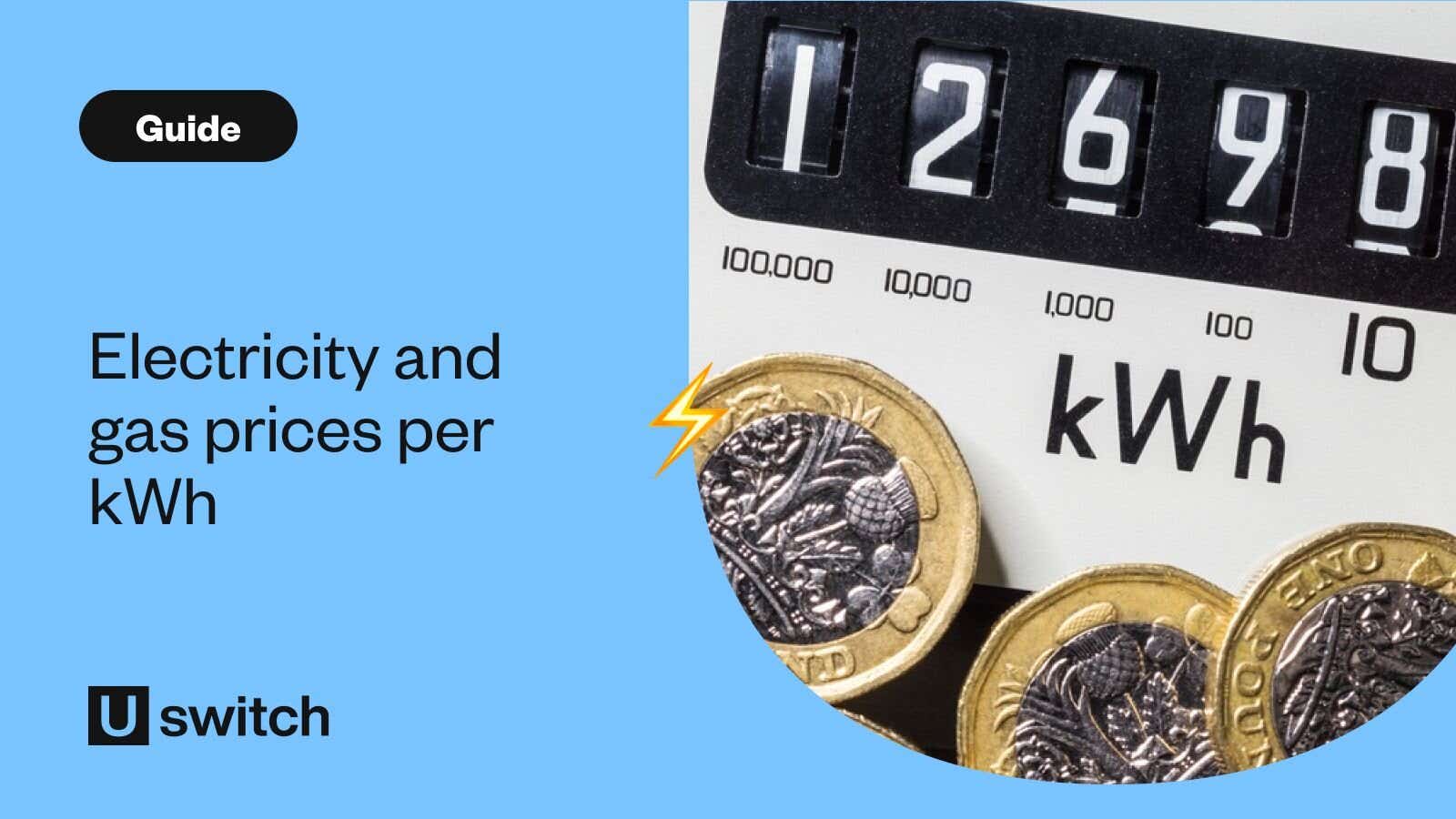How much is a kWh of electricity? Gas and electric costs explained


Why is our energy measured in kWh? In this guide, we explain what a kWh is, how much a kWh currently costs in the UK and how to use kWh to work out your gas and electricity usage.
What is a kWh?
A kWh or kilowatt-hour is the name given to a unit of energy. It's typically used to determine how much energy a household has consumed over a period of time.
A kWh is the standard unit used by energy suppliers to calculate your gas and electricity bill. One unit of electricity or gas refers to the use of 1,000 watts over one hour.
So how much is that in reality?
The three common energy user groups as defined by Ofgem are below, and provide an indication of how many kWh of electricity and gas different-sized properties use annually.
| Typical energy usage (property type and size) | Average annual electricity consumption | Average annual gas consumption |
|---|---|---|
| Low (flat or 1-bedroom house/1-2 people) | 1,800 kWh | 7,500 kWh |
| Medium (3-bedroom house/2-3 people) | 2,700 kWh | 11,500 kWh |
| High (5-bedroom house/4-5 people) | 4,100 kWh | 17,000 kWh |
What’s the difference between a kW and a kWh?
Kilowatts (kW) represent a unit of power, whereas a kilowatt-hour (kWh) is a unit of energy.
Put simply, kW refers to how much energy a device needs to work and kWh represents how much energy has actually been used.
A power rating is the amount of electrical power needed for an appliance to work at any given moment. Energy is what is needed to keep the power going. So to keep an appliance with a power rating of one kW running for one hour, it would require one kWh of energy.
What is the gas and electricity cost per kWh in the UK?
There is no standard price for electricity cost per kWh in the UK, which means your cost could vary from your neighbour's. For the price cap that runs from 1 January to 31 March 2026, the average unit rates are:
| Electricity | Gas | |
|---|---|---|
| Unit rates | 27.69p per kWh | 5.93p per kWh |
Your actual kWh costs will depend on a variety of factors including where you live, what kind of energy plan you are on, what payment method you use and, in some cases, what time you consume the energy. Find your exact electricity and gas price per kWh using the sample bills in our guide to how to read your energy bill.
What are the historical kWh rates?
You can see how kWh rates have changed since the autumn of 2021 below. At the moment, they're relatively middling - not as low as they've been but not as high either.
| Price cap period | Electricity average cost per kWh | Gas average cost per kWh |
|---|---|---|
| 1 October 2021 - 31 March 2022 | £0.21 per kWh | £0.04 per kWh |
| 1 April - 30 September 2022 | £0.28 per kWh | £0.07 per kWh |
| 1 October 2022 - 30 March 2023 | £0.34 per kWh | £0.10 per kWh |
| 1 April 2023 - 30 June 2023 | £0.33 per kWh | £0.10 per kWh |
| 1 July 2023 - 30 September 2023 | £0.30 per kWh | £0.08 per kWh |
| 1 October 2023 - 31 December 2023 | £0.27 per kWh | £0.07 per kWh |
| 1 January 2024 - 31 March 2024 | £0.29 per kWh | £0.07 per kWh |
| 1 April 2024 - 30 June 2024 | £0.24 per kWh | £0.06 per kWh |
| 1 July 2024 - 30 September 2024 | £0.22 per kWh | £0.05 per kWh |
| 1 October 2024 - 31 December 2024 | £0.24 per kWh | £0.06 per kWh |
| 1 January 2025 - 31 March 2025 | £0.25 per kWh | £0.06 per kWh |
| 1 April 2025 - 30 June 2025 | £0.27 per kWh | £0.07 per kWh |
| 1 July 2025 - 30 September 2025 | £0.26 per kWh | £0.06 per kWh |
| 1 October 2025 - 31 December 2025 | £0.26 per kWh | £0.06 per kWh |
| 1 January 2026 - 31 March 2026 | £0.28 per kWh | £0.06 per kWh |
How to use kWh to switch energy
Switching energy with Uswitch is easy. With fixed energy deals returning to the market, you can compare energy prices in minutes to see what your options are and switch if there's a good deal on offer.
Knowing your consumption in kWh can save you a huge amount of money. Running a comparison using your consumption or usage figures in kWh is the best way to get an accurate quote.
How many kWh do my appliances use?
The exact level of energy usage your appliances use will vary depending on the type of appliance, its make and model and whether it has an eco or low power setting.
As a general rule of thumb, larger appliances use more energy. For instance, dishwashers and tumble dryers can use about 3 kWh per cycle. Smaller appliances like kettles or plugged-in chargers use much less energy (1 kWh or lower).
How can I save energy?
If you think you're using too much energy, the best way is to keep track of your energy usage via an app like Utrack. This will help you identify areas where you're using more energy than you need to. A few ideas might be:
- Turn the thermostat down by a single degree
- Use the tumble dryer less (or not at all)
- Only boil the amount of water you need in the kettle.
Our guide covers more than 100 energy-saving tips for all budgets here.